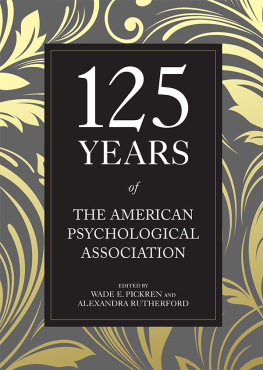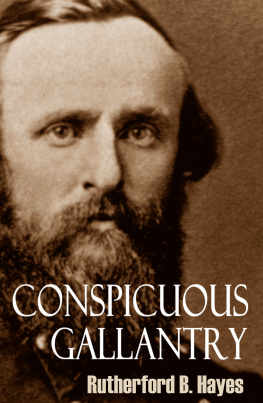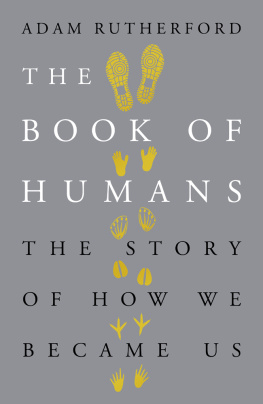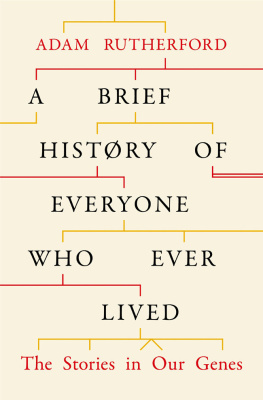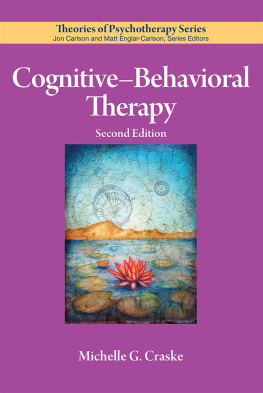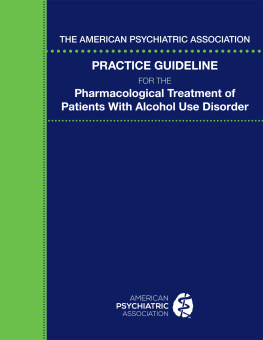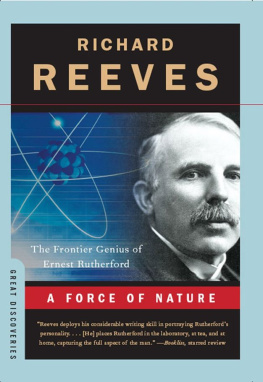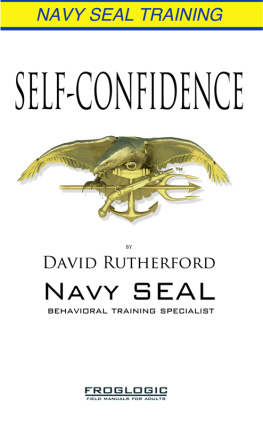Wade E. PickrenAlexandra Rutherford - 125 Years of the American Psychological Association
Here you can read online Wade E. PickrenAlexandra Rutherford - 125 Years of the American Psychological Association full text of the book (entire story) in english for free. Download pdf and epub, get meaning, cover and reviews about this ebook. year: 2017, publisher: American Psychological Association, genre: Religion. Description of the work, (preface) as well as reviews are available. Best literature library LitArk.com created for fans of good reading and offers a wide selection of genres:
Romance novel
Science fiction
Adventure
Detective
Science
History
Home and family
Prose
Art
Politics
Computer
Non-fiction
Religion
Business
Children
Humor
Choose a favorite category and find really read worthwhile books. Enjoy immersion in the world of imagination, feel the emotions of the characters or learn something new for yourself, make an fascinating discovery.
- Book:125 Years of the American Psychological Association
- Author:
- Publisher:American Psychological Association
- Genre:
- Year:2017
- Rating:3 / 5
- Favourites:Add to favourites
- Your mark:
- 60
- 1
- 2
- 3
- 4
- 5
125 Years of the American Psychological Association: summary, description and annotation
We offer to read an annotation, description, summary or preface (depends on what the author of the book "125 Years of the American Psychological Association" wrote himself). If you haven't found the necessary information about the book — write in the comments, we will try to find it.
125 Years of the American Psychological Association — read online for free the complete book (whole text) full work
Below is the text of the book, divided by pages. System saving the place of the last page read, allows you to conveniently read the book "125 Years of the American Psychological Association" online for free, without having to search again every time where you left off. Put a bookmark, and you can go to the page where you finished reading at any time.
Font size:
Interval:
Bookmark:
THOMAS C. CADWALLADER
The organizational, or preliminary, meeting of what was to become the American Psychological Association was convened by G. Stanley Hall at Clark University in Worcester, Massachusetts, on July 8, 1892. That meeting was the consequence of a number of developments in American intellectual thought over more than a century. The main goal of this chapter is to show these developments in terms of some of the intertwining paths of 19th-century American psychology, in the broader context of higher education, that created a professional identity conducive to the founding of the American Psychological Association (APA).
The intellectual root of the APA lies within American academic psychology. There, two major changes during the 19th century are of significance. The first was psychologys evolution from a philosophic to a scientific enterprise. The major event in this evolution was the adoption of the FechnerianWundtian tradition. This tradition began in Europe with the 1860 publication of Elements of Psychophysics (1860/1966) by Gustav Theodor Fechner (18011887). The Elements demonstrated that certain psychological questions can be answered by the same techniques used by physiology and physics (i.e., that certain psychological questions fall with the domain of scientific inquiry).
This tradition was furthered and proselytized by Wilhelm Wundt (18321920), whose 1874 Principles of Physiological Psychology became the intellectual model for perhaps the first three generations of American scientific psychologists. The adoption of the FechnerianWundtian model permitted and perhaps dictated the differentiation of psychology from its parent, philosophy, just as has been done by all disciplines since antiquity, when philosophy encompassed all learning. However, the separation process was only partially accomplished at the founding of the APA; this explains the widely divergent interests and backgrounds of the early members of the Association.
The second change was in the nature of higher education itself, involving the transition of colleges and universities from strictly undergraduate institutions to organizations including and often centering on graduate education. It was from the realm of graduate education, particularly the granting of PhDs, that much of the push for professionalization came in America. One might conceptualize higher education as the soil in which psychology was rooted and in which it eventually flowered.
Three institutions of higher education played major roles in the twin stories of the evolution of psychology and higher educationYale, Harvard, and Johns Hopkinsalthough many others also played significant roles.
Yale Universitys role was in introducing the nations first graduate programs (including one in psychology) in 1847. This step led to the granting of the first earned PhD degrees (including one in philosophy and psychology) in 1861.
Harvard Universitys role was in developing an orientation in FechnerianWundtian psychology. Harvard offered the first course in this tradition (in 18751876); gave the first laboratory demonstrations and began the first informal psychology laboratory (in the second half of the 1870s); established the first trustee-sanctioned psychology laboratory (which opened in the fall of 1895); and awarded the worlds first PhD in psychology (in 1878).
Johns Hopkins Universitys role was as the first institution to be founded on the notion that graduate education and research were its primary objectives. In keeping with this role, Johns Hopkins established the first productive (but trustee-antisanctioned) psychology laboratory (in 1883), the first PhD program in psychology in the FechnerianWundtian tradition (Johns Hopkinss first psychology PhD was awarded in 1886), and the first psychological journal in English in the FechnerianWundtian tradition (The American Journal of Psychology, in 1887). Moreover, the model on which the APA was based may well have been provided at Johns Hopkins.
The changes in psychology and higher education that occurred during the 19th century were so large that they may well fit the broad (if not the narrow) definition of paradigm shifts outlined in Kuhns (1970) The Structure of Scientific Revolutions.
During the first half of the 19th century, most American colleges included among their courses one most commonly called Intellectual Philosophy (e.g., Harvard University Catalogue,
Intellectual philosophy was usually taught during the senior year, often by the college president. Until well into the second half of the 19th century, most college presidents were clergymen. This generalization held even for state-supported institutions. Early on, the course often had strongly religious and moral purposes. It was a capstone course designed to prepare the student for life in the world outside of the college.
In the late 18th and early 19th centuries, natural sciences had begun their separation from philosophy under the titles Natural History (which later became separated into zoology and geology) and Natural Philosophy (later physics), although both courses were still common well into the 19th century. The subject matters that were to become psychology, however, were still connected to their philosophical and even theological apron strings, but things began to change during the second decade of the 19th century.
We can precisely date the arrival of philosophical psychology in America. Jeremiah Dummer (16791739; the colonial agent for Connecticut in England) solicited aid, including some 900 books for the newly established (1701) Collegiate School, then located in Saybrook, Connecticut. Among the books sent in 1714 were those of the core authors of Britains Enlightenment (e.g., Francis Bacon [15611626], Isaac Newton [16421727], and John Locke [16321704]). The copy of Lockes Essay Concerning Human Understanding (1690) was contributed by Elihu Yale (16491721), the Boston-born but English-raised East India Company official for whose substantial gifts the Collegiate School was renamed Yale College in 1718. Yales copy of Locke was apparently the first in America and directly influenced the thought of several individuals, including two Yale graduates, Samuel Johnson (16961772) and Jonathan Edwards (17031758), who were to be forces in Americas new learning in general, and philosophical psychological thought in particular, during the 18th century (Ellis, 1973; Evans, 1984). Lockes Essay would be immensely influential in the development of the structure of courses dealing with the study of the human mind (Evans, 1984, pp. 2226).
Lockes (1690) Essay began to lose favor in the early part of the 19th century because of the influence of the writings of Thomas Reid and other members of the Scottish realist school of philosophy. Their books were first imported by and used in the new colleges set up across America by the Presbyterian Church, then elsewhere. The contents of Reids Essays on the Intellectual Powers of Man (1785) and Essays on the Active Powers of the Human Mind (1788) are almost completely psychological (Evans, 1984, p. 38). Courses in American colleges grew to be organized around the contents of the texts used (Snow, 1907, p. 129).
By the second decade of the 19th century, American professors who taught mental philosophy and intellectual philosophy courses began to work up their class notes and to publish them as their own textbooks. Thomas Upham (17991872) of Bowdoin College in the frontier of Maine published one of the most successful of these under the title Elements of Intellectual Philosophy (1826). Uphams book, later expanded and renamed
Font size:
Interval:
Bookmark:
Similar books «125 Years of the American Psychological Association»
Look at similar books to 125 Years of the American Psychological Association. We have selected literature similar in name and meaning in the hope of providing readers with more options to find new, interesting, not yet read works.
Discussion, reviews of the book 125 Years of the American Psychological Association and just readers' own opinions. Leave your comments, write what you think about the work, its meaning or the main characters. Specify what exactly you liked and what you didn't like, and why you think so.

